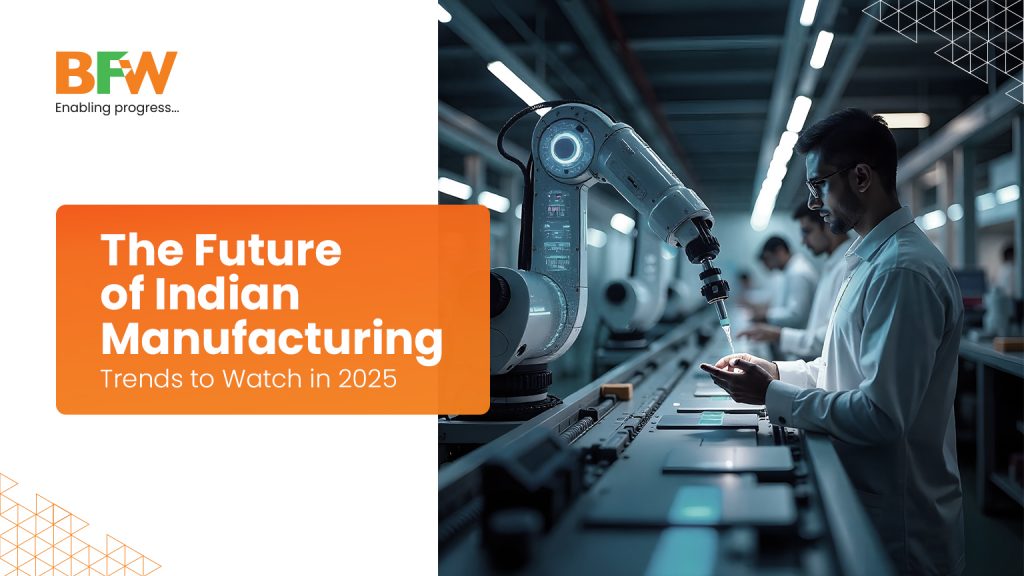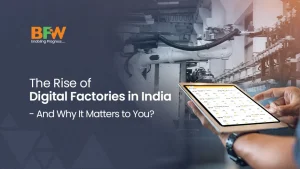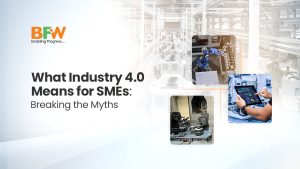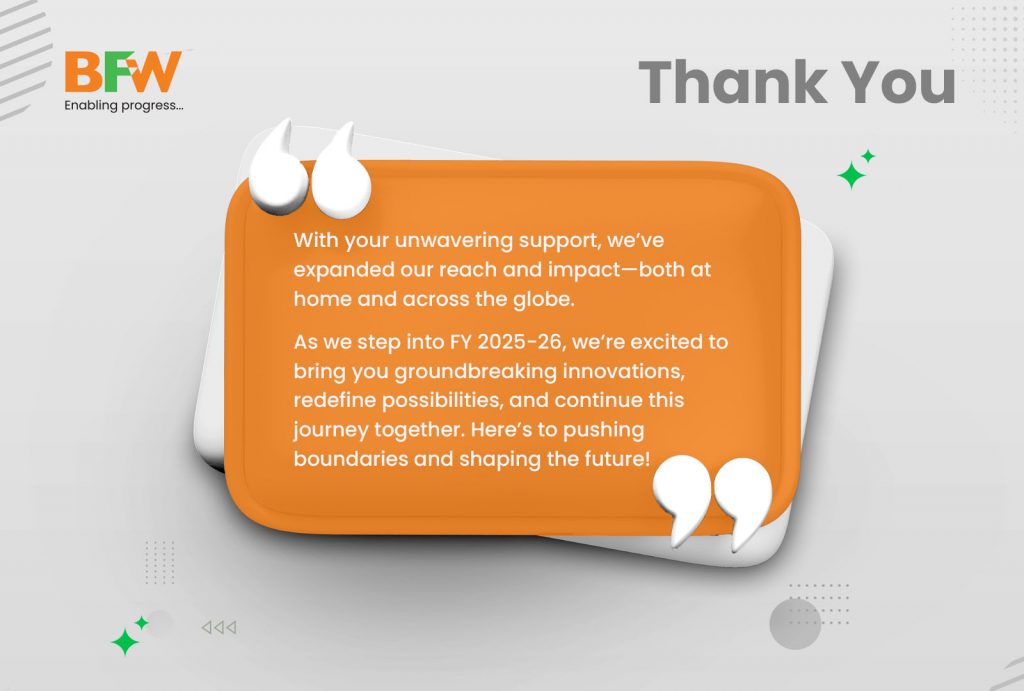As we progress through 2025, the manufacturing sector continues to undergo significant transformation. For machine tools solutions providers like Bharat Fritz Werner (BFW), understanding these evolving trends is essential to delivering value to customers and maintaining competitive advantage in a dynamic marketplace.
In this blog, we explore the key trends shaping the manufacturing industry in 2025:
1. Digital transformation acceleration
Digital transformation has moved from aspirational to essential. In 2025, manufacturers are increasingly integrating advanced technologies across their operations. Some of these advanced technologies are:
- Artificial Intelligence (AI) and Machine Learning (ML): Predictive maintenance has changed the way manufacturing facilities function. With AI systems predicting equipment failures before they occur, manufacturers have been able to reduce downtime, save costs, and improve productivity. ML algorithms are optimising production schedules in real-time, adjusting for supply chain disruptions, energy costs, and customer demand patterns.
- Industrial Internet of Things (IIoT): The use of sensors throughout production facilities has created data-rich environments where different machines communicate with each other and with operation systems. This connectivity is enabling unprecedented visibility into operations and creating new efficiency standards.
- Digital twins: Virtual replicas of physical assets are being used to simulate production processes, test new configurations, and train operators in risk-free environments. These digital twins are increasingly sophisticated, incorporating real-time data to reflect current conditions accurately.
2. Resilient supply chains
The supply chain disruptions of the recent past have fundamentally changed how manufacturers approach their supplier relationships and inventory management. Here are some notable supply chain trends:
- Nearshoring and reshoring: Many manufacturers have rebalanced their supply chains, bringing critical component production closer to home. This trend is driving investment in domestic manufacturing capabilities and creating opportunities for machine tool providers to support capacity expansion.
- Supply chain visibility: End-to-end visibility has become a competitive necessity. Manufacturers are investing in platforms that provide real-time tracking of components and materials, from raw material suppliers to finished product delivery.
- Strategic inventory management: The just-in-time model has evolved to incorporate strategic buffers for critical components. Manufacturers are using advanced analytics to determine optimal inventory levels that balance resilience against capital efficiency.
3. Sustainable manufacturing
Environmental sustainability has transitioned from a corporate social responsibility initiative to a core business strategy. Here’s how businesses are striving for more sustainable practices:
- Energy efficiency: Rising energy costs and carbon regulations are driving investment in more energy-efficient machine tools and processes. Manufacturers are scrutinising the energy consumption of their equipment and prioritising solutions that reduce their carbon footprint.
- Circular economy practices: Design for disassembly and recycling is becoming standard practice. Machine tool providers that can support these processes with flexible, adaptable equipment are gaining market share.
- Green materials: The use of sustainable and recyclable materials is increasing, requiring machine tools that can effectively process these sometimes challenging materials while maintaining precision and quality.
4. Workforce Evolution
The manufacturing workforce is undergoing significant change, creating both challenges and opportunities for manufacturing companies. Here are some key trends:
- Skills gap mitigation: Manufacturers are partnering with educational institutions and investing in internal training programs to develop the skills needed for increasingly technical manufacturing roles.
- Augmented workforce: Collaborative robots (cobots) and augmented reality (AR) tools are enhancing human capabilities on the shop floor. These technologies are making manufacturing roles more accessible to a broader range of workers and helping to address labour shortages.
- Remote operations: Remote monitoring and operation capabilities have expanded, allowing experts to support multiple facilities from central locations. This trend is driving demand for machine tools with robust remote connectivity and diagnostic features.
- Recruiting women: There is an increasing push to recruit women in manufacturing facilities, owing to their skills and multitasking capabilities. Many companies have set up initiatives and goals to increase the number of women in their manufacturing workforce.
5. Advanced materials and manufacturing processes
Innovation in materials science and manufacturing processes continues to create new possibilities. Here are some trends:
- Additive manufacturing: 3D printing has moved beyond prototyping to become an integral part of production for specific components, particularly those with complex geometries or customised features. Hybrid machines that combine additive and subtractive processes are gaining traction.
- Composite materials: The use of advanced composites is expanding beyond aerospace into automotive, energy, and consumer goods. These materials require specialised machining solutions that can deliver precision while managing the unique challenges of composite processing.
- Micro and nano manufacturing: Precision at increasingly small scales is enabling new product categories, from medical devices to advanced electronics. Machine tools capable of micro-machining with extreme precision are in high demand.
How BFW contributes to these opportunities
BFW has been a pioneer in advanced manufacturing in India. The company has been leading the machine tools manufacturing sector with advanced innovations, such as automation, data and analytics, robotics, additive manufacturing, and more. Here are some ways in which BFW is contributing to the manufacturing sector:
- Integrated solutions: Customers increasingly seek complete solutions rather than standalone machines. BFW offers integrated systems—incorporating software, connectivity, and services alongside hardware—to provide more value to customers.
- Flexible manufacturing systems: As customisation increases, flexible systems that can be quickly reconfigured for different products are becoming essential. BFW offers advanced customisation of machinery to match customers’ specific requirements, enabling agility and flexibility in production processes.
- Sustainability features: Increasingly, many manufacturing companies are seeking machine tool solutions that minimise energy consumption, reduce waste, and support circular economy practices. Sustainability is at the core of BFW’s business and offerings.
- Knowledge services: As manufacturing becomes more complex, customers value partners who can provide expertise and training alongside equipment. BFW offers efficient post-purchase services, including training and educating the staff at customers’ shop floors and building deeper customer relationships.
- Data-driven business models: The rich data generated by modern machine tools creates opportunities for new business models, including performance-based contracts and predictive maintenance services. BFW’s integrated automation and data analytics systems are helping modern and ambitious businesses utilise the power of data more efficiently.
- DOMS (Digital Operation Management System): At BFW, innovation drives our digital transformation and AI-powered processes. Our new Thali plant near Hosur embodies this vision with an advanced connected manufacturing facility. The in-house Digital Operation Management System (DOMS) enables digital twinning, component traceability, intelligent shopfloor management, and real-time customer access, ensuring trust and transparency. Operations and Analytical dashboards enhance data-driven decisions, Built-in Quality, and efficiency, while our Autonomous Mobile Robots (AMR) streamline material transport with intelligent safety features. By integrating AI and digital technologies, BFW is building a smarter, more agile, and transparent ecosystem.
Wrapping up
The manufacturing landscape of 2025 is characterized by digital transformation, resilient supply chains, sustainability imperatives, workforce evolution, and advanced materials and processes. BFW has been a pioneer in embracing these advanced manufacturing trends that help customers navigate this complex and rapidly evolving environment.
By focusing on integrated solutions, flexibility, sustainability, knowledge services, and data-driven business models, BFW has positioned itself as an efficient partner to manufacturers as they build the factories of the future.
If you’re looking for advanced machine tools manufacturing systems for your facility, contact BFW.










